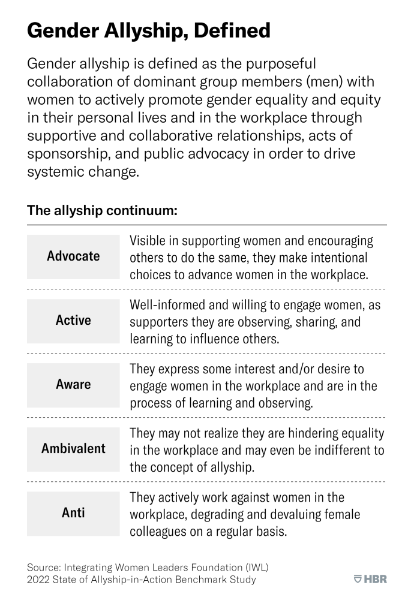Men Are Worse Allies Than They Think
The meteoric rise of allyship as a focus of diversity, equity, and inclusion (DEI) efforts is largely due to employee demands for tangible workplace change in the wake of widespread protests against racism and evidence of deep gender inequities laid bare by the pandemic. Yet, despite a new focus on allyship education and programming, research shows that women and other underrepresented groups see less evidence than men of measurable workplace change.
We define gender allyship as the purposeful collaboration of dominant group members (men) with women to actively promote gender equality and equity in their personal lives and in the workplace through supportive and collaborative relationships, acts of sponsorship, and public advocacy in order to drive systemic change. (For a full breakdown of the allyship continuum, see the table below.) This definition emphasizes the interpersonal aspect of developing awareness and motivation, public action to create accountability and transparency, and systemic change that is long-lasting and sustainable.
To better understand how men are demonstrating allyship with women, the Integrating Women Leaders Foundation (IWL) conducted the 2022 State of Allyship-In-Action Benchmark Study, a survey of 1,150 participants in mid-sized to Fortune 500 companies across industries that examined the perceived prevalence and effectiveness of interpersonal and public allyship from the vantage point of both men and women. The results shed light on how women and men perceive and participate in allyship programs, what’s moving the needle to create meaningful change, and where there are opportunities for managers and corporate leaders to refocus attention and resources around DEI efforts to drive business value.
The good news first: The study revealed that a majority of women and men similarly agreed that they would recommend their organization as a great place to work and were planning to stay. Consistent with research on the interaction and impact of perceived manager support on organizational commitment and retention, the participants’ company loyalty and satisfaction were highly correlated with perceived manager support and career advocacy.

